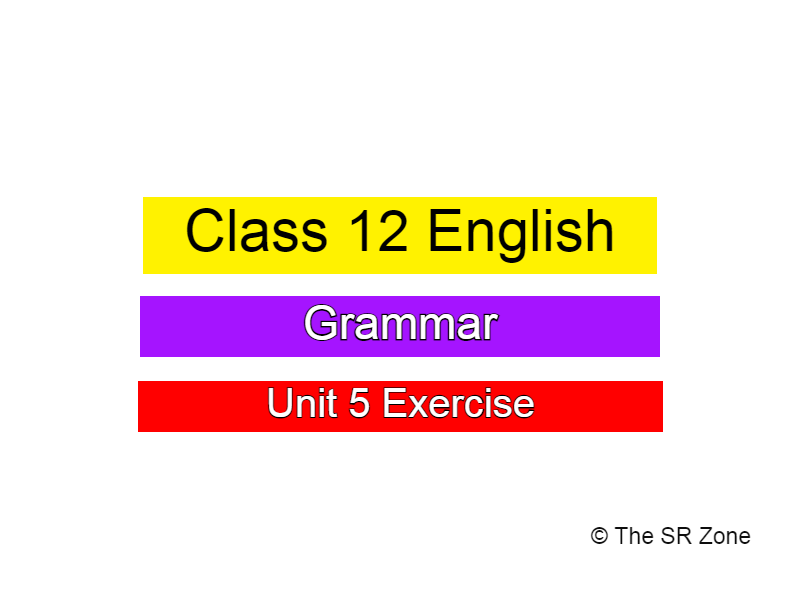Class 12 English Grammar Unit 5 Connectives Exercise
Unit 5 Grammar
Connectives PDF
To join together words, phrases, clauses, and sentences, we utilize conjunctions. There are three different kinds of conjunctions: 1. A coordinate conjunction
This kind of conjunction often connects two equal elements of a phrase.
Structure : Subject 1 + verb 1 + Coordinating conjunction + subject2 + verb2
They are for, and, nor, but, or, yet, so etc. They are used to combine words
Ex. She like tea and coffee. They are used for combining phrases.
Ex. He may be in the room or on the roof. They are also combined with an independent clause. Ex. The mouse attempted to flee but the cat attacked it.
2. Subordinating conjunctions
These are used to link a subordinate clause (also known as a dependent clause) to the main phrase.
Examples : because, if, up to, till, while, after, wherever, provided that, as soon as, even if, even if, how, whether, once, since While I was walking home from school, I purchased some fruits. When night fell, they slept. 3. Correlative Conjunction
These conjunctions unite words, phrases, or sentences that are complimentary to one another or have a reciprocal relationship.
Examples: Either or, Neither Nor, Whether Or, Not only, but also Not only English, I can also speak French. Either I or you are going to leave.
Here are some mnemonics you can use to help you remember how to use connectives accurately:
AAAWWUBBIS - This stands for "after, although, as, when, while, unless, because, before, if, since." These are all subordinating conjunctions, which are connectives that join a dependent clause to an independent clause.
SWABIs - This stands for "since, when, although, because, if." These are some of the most common subordinating conjunctions, which are used to connect dependent and independent clauses.
CUBES - This stands for "consequently, ultimately, but, either...or, similarly." These are some examples of connectives that can be used to show cause and effect, contrast, and comparison.
FANBOYS - As mentioned earlier, this acronym stands for "for, and, nor, but, or, yet, so." These are coordinating conjunctions, which are used to join two independent clauses.
By using these mnemonics, you can better remember the different types of connectives and how to use them accurately in your writing.
A. Study the following sentences and underline the connectives.
a. Although she spoke very fast, I understood what she meant to say.
b. In spite of her hard labour, she failed her exam.
c. Though he had all the required qualifications, he did not get the job.
d. Despite having all the qualifications, he did not get the job.
B. Join the following pairs of sentences twice, using a/though/though/even though and despite/in spite of as in the example.
Example: Nepali people have limited income. They are very happy.
i. Although Nepali people have limited income, they are happy.
ii. Nepali people are happy in spite of their limited income.
a. He is a millionaire. He lives in a simple house.
i) Although he is a millionaire, he lives in a simple house.
ii) In spite of his richness, he lives in a simple house.
b. The weather was extremely bad. The pilot landed the plane safely.
i) Even Though the weather was extremely bad, the pilot landed the plane safely.
ii) Despite the bad weather, the pilot landed the plane safely.
c. We study in the same college. We hardly see each other.
i) Although we study in the same college, we hardly see each other.
ii) Despite studying in the same college, we hardly see each other.
d. It rained heavily. We enjoyed our holiday.
i) Although it rained heavily, we enjoyed our holiday.
ii) In spite of heavy rain, we enjoyed our holiday.
e. I had an umbrella. I got wet in the rain.
i) Although I had an umbrella, I got wet in the rain.
ii) In spite of having an umbrella, I got wet in the rain.
f. I was really tired. I could not sleep for a moment.
i) Even though I was really tired, I could not sleep for a moment.
ii. Despite the tiredness, I could not sleep for a moment.
g. She has a very good accent in English. She failed the interview with the newsreader.
i) Although she has a very good accent in English, she failed the interview of a newsreader.
ii) In spite of a very good accent in English, she failed the interview of a newsreader.
h. Lhasa has extremely cold weather in winter. Millions of tourists go there in January.
i) Although Lhasa has extremely cold weather in winter, millions of tourists go there in January.
ii) In spite of extremely cold weather, millions of tourists go to Lhasa in January.
i. He was badly injured in the first round of the boxing match. He was victorious in the third round.
i) Although he was badly injured in the first round of the boxing match, he was victorious in the third round.
ii) In spite of his injury in the first round of the boxing match, he was victorious in the third round.
C. Complete each sentence in an appropriate way.
a. He passed the exam although he did not study well.
b. She climbed the mountain in spite of her tiredness.
c. He didn't give any alms to the beggars even though he was very rich.
d. In spite of his poor eyesight, he could read the newspaper,
e. She never helps other though she is very sociable
f. He didn't get success in that job in spite of his ten attempts.
g. He refused to eat anything despite his hunger.
h. He could not score good grades in the SEE exams in spite of his hard efforts.
i. She accepted the job although she didn't like it.
j. Even though we had planned everything carefully, we didn't succeed.
